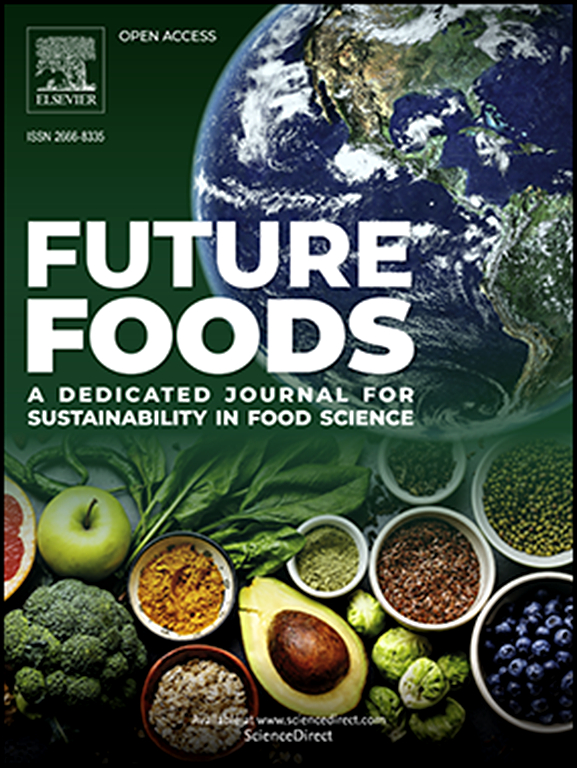消费者对植物性海鲜替代品和调味剂的认知和不稳定概况
IF 8.2
Q1 FOOD SCIENCE & TECHNOLOGY
引用次数: 0
摘要
植物性海产品替代品(pbsa)可以在解决与传统海产品消费相关的生态、伦理和健康问题方面发挥重要作用。然而,复制海鲜复杂的感官品质仍然是一个重大挑战。采用顶空固相微萃取-气相色谱-质谱联用技术,对16种pbsa和21种PB海鲜调味剂的风味特性进行了感官评价和挥发性分析。感官分析揭示了气味特征的显著差异,正宗的海鲜样品显示出更强的海洋和鱼的气味,而pbsa则显示出明显的蔬菜和沉重的气味。挥发性分析确定了关键的海鲜气味,这些气味要么不存在,要么在pbsa中浓度过高,导致感官知觉不匹配。此外,基于不同的配方策略,PB调味剂表现出不同的挥发性特征和气味属性。值得注意的是,虽然一些调味剂成功地提供了类似海鲜的气味,其主要挥发性特征由典型的海鲜气味组成,但其他调味剂含有与海鲜特征无关的化合物。这些发现突出了目前PBSA风味配方的局限性,特别是在复制海鲜的微妙气味特征方面。本文章由计算机程序翻译,如有差异,请以英文原文为准。
Consumer perceptions and volatile profiles of plant-based seafood alternatives and flavouring agents
Plant-based seafood alternatives (PBSAs) can play an important role in addressing ecological, ethical, and health concerns associated with traditional seafood consumption. However, replicating the complex organoleptic qualities of seafood remains a significant challenge. This study investigates the flavour characteristics of 16 PBSAs and 21 PB seafood flavouring agents through sensory evaluation and volatile profiling using headspace solid-phase microextraction gas chromatography–mass spectrometry. Sensory analyses revealed significant differences in odour profiles, with authentic seafood samples exhibiting stronger marine and fish-like odours, while PBSAs displayed pronounced vegetable and beany notes. Volatile analysis identified key seafood odourants that were either absent or present in excessive concentrations in PBSAs, contributing to mismatched sensory perceptions. Additionally, PB flavouring agents demonstrated diverse volatile profiles and odour attributes based on their formulation strategies. Notably, while some flavouring agents successfully delivered seafood-like odours with key volatile profiles consisting of typical seafood odourants, others contained compounds unrelated to seafood profiles. These findings highlight the limitations of current PBSA flavour formulations, particularly in replicating the subtle odour characteristics of seafood.
求助全文
通过发布文献求助,成功后即可免费获取论文全文。
去求助
来源期刊

Future Foods
Agricultural and Biological Sciences-Food Science
CiteScore
8.60
自引率
0.00%
发文量
97
审稿时长
15 weeks
期刊介绍:
Future Foods is a specialized journal that is dedicated to tackling the challenges posed by climate change and the need for sustainability in the realm of food production. The journal recognizes the imperative to transform current food manufacturing and consumption practices to meet the dietary needs of a burgeoning global population while simultaneously curbing environmental degradation.
The mission of Future Foods is to disseminate research that aligns with the goal of fostering the development of innovative technologies and alternative food sources to establish more sustainable food systems. The journal is committed to publishing high-quality, peer-reviewed articles that contribute to the advancement of sustainable food practices.
Abstracting and indexing:
Scopus
Directory of Open Access Journals (DOAJ)
Emerging Sources Citation Index (ESCI)
SCImago Journal Rank (SJR)
SNIP
 求助内容:
求助内容: 应助结果提醒方式:
应助结果提醒方式:


